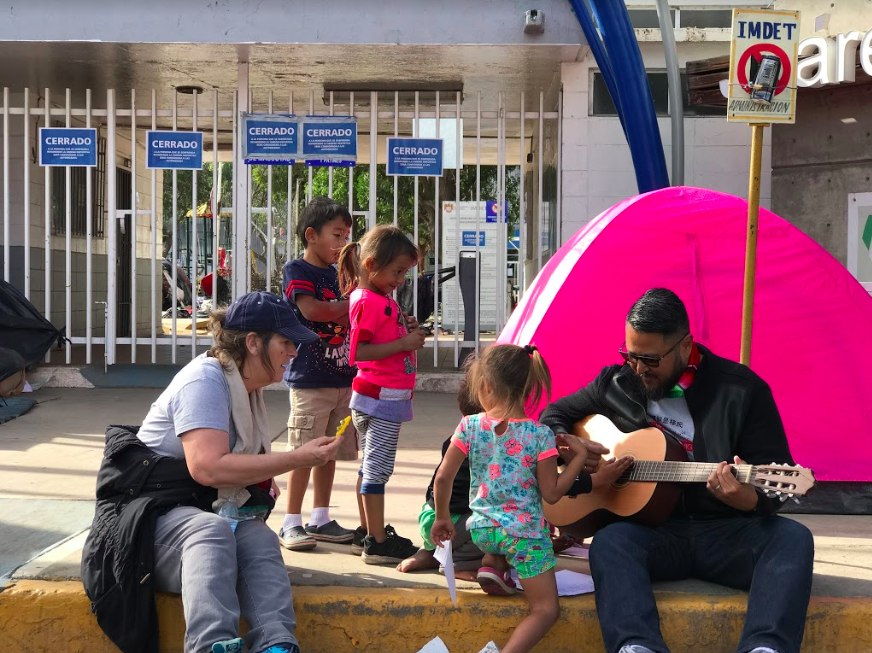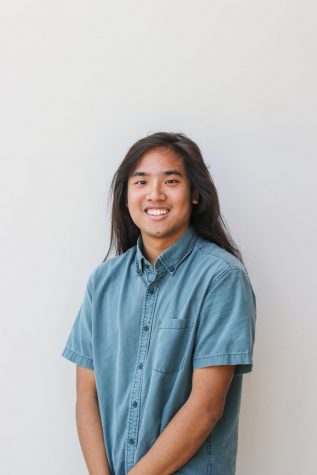When we first crossed the border into Tijuana, each step took us from a sunny Tuesday afternoon in San Diego to the tense atmosphere surrounding the migrant caravan encampment. Uneasiness permeated our environment as police officers lined certain blocks and soldiers navigated the streets with their trucks.
The camp was down a long road, tents lining both sides. As we walked through the street, the part-time residents sat on sidewalks, eating their afternoon meals and staring at us Americans in our “Jesus was an immigrant” t-shirts. The camp was at the end of a long journey, of walking through countries and receiving varying levels of care along the way. The tents had become their homes, their place to live no matter the conditions. Each individual came with a story, a reason, a decision and a purpose of their own among the unified group.
In October, NBC reported that Honduran citizens began leading a migrant caravan from San Pedro Sula in order to reach the United States. The group of under 200 Hondurans grew to more than 7,000 Central Americans, according to the United Nations. The New York Times reported that these migrants sought new lives as they left poverty and violence.
By Nov. 14, thousands of migrants had reached Tijuana, Mexico through combinations of walking, public transportation and rides provided by locals. According to the Associated Press, these migrants were placed in crowded shelters, some of which filled with double the amount of people the space allotted for. Over 100 miles north, some on Biola’s campus took notice.
MATTHEW 25 MODEL OF SERVING
Professor of sociology Brad Christerson holds a leadership position with the social activism group Matthew 25. According to their website, Matthew 25 is composed of national faith-based groups and grassroots activists who “seek to creatively contribute in advocacy for policy reform at the governmental level.”
As a way of organizing a space of peace, Christerson, Matthew 25 leaders and community members from Christian and Muslim backgrounds scheduled day trips to a migrant caravan encampment in Tijuana. For Christerson, the trip offered an opportunity to follow the truth of God’s Word.
“[In] Matthew 25, Jesus says, ‘Whatever you do for the least of these, you did to me,’” Christerson said. “That includes people who are in prison, people who are poor, people who are hungry and people who are immigrants. These folks are hitting a lot of those categories, so I feel like we’re going to see Jesus today and to try to connect with him and be a blessing however we can to the people there. That’s really what God calls us to do.”
ENTERING MIGRANT CARAVAN ENCAMPMENT
The encampment was called Benito Juarez. Our view included no physical bathrooms, a large pile of trash at the corner of the street and some children running around barefoot. We looked up and saw a blue sky marked with beautiful clouds, but those clouds also meant rain was approaching.
Previously a sports complex, the structure was used to shelter migrants until it was officially shut down on Nov. 30, four days before we were there, due to health concerns, according to a CNN report. While most of the migrants were ordered to move to another shelter in an area called El Barretal, many stayed at Benito Juarez. The police described this estimated group of 500 as “troublemakers” for this reason.
SPIRIT OF CARE AND PEACE
At the encampment, our mission quickly became more clear: create a caring environment for the migrants. Each team received instructions to pray for and listen to the stories of the migrants. Our team was lead by Robert Chao Romero, Matthew 25 leader, professor of Chicana/o and Asian-American studies at University of California, Los Angeles and regular speaker at the annual Student Congress on Racial Reconciliation conference. We focused on searching for the right place to settle down and play worship music.
“What I do with the music is I made song sheets with a few songs, like you do with church and I just see, ‘Does anyone want to sing?’” Romero said. “And just trust that the Holy Spirit will meet us in that place and if people pray, they pray, if they sing, they sing. It’s just to create a safer space like that. That’s my simple hope.”
We watched as children surrounded Romero, playfully plucking at his guitar strings, drawing on another team member’s face, using song sheets as their art canvases and bringing their own toys to join the joyous atmosphere. We walked, stood and sat alert, not knowing what we were to encounter in the next moment. Our minds flooded with the stories we could tell and the photos we could take while simultaneously experiencing joy, sadness and worry.
Suddenly, a man walked into the middle of the street and started making an announcement in Spanish. Following the announcement, a large crowd formed in the middle of the street where commotion brewed with apparent chaos and frustration. Then, Vanessa Ramirez Soltero, a Matthew 25 organizer, urgently ushered us out of the encampment in the midst of uncertainty.
TRIP OF SOLIDARITY
Leaving the encampment, something felt incomplete. We did not provide for any of their immediate needs regarding food, water or health, but this trip was not meant as humanitarian aid. Rather, according to Christerson, it was an opportunity for Matthew 25 to stand in solidarity with the migrants, both spiritually and emotionally.
“It was powerful to meet people who have been through that journey and to see them face-to-face,” Christerson said. “To see the kids, see the moms and dads. Just knowing what they’ve been through and being there with them and seeing them face-to-face and meeting them was pretty powerful.”
The power of the day came through prayer and seeing the people as fellow humans. For alumna and incoming graduate student Andrea Piedrasanta, she saw the instances of praying and talking with people as important bonds to be made.
“What changed in my mind is the connection. There needs to be a connection,” Piedrasanta said. “Because we can have communication issues and we can have degrees and we can have all this type of titles, but if we cannot make that connection, nothing matters. That’s important for me to make that connection and today that confirmed that that’s what I’m supposed to be doing, to make that connection.”














